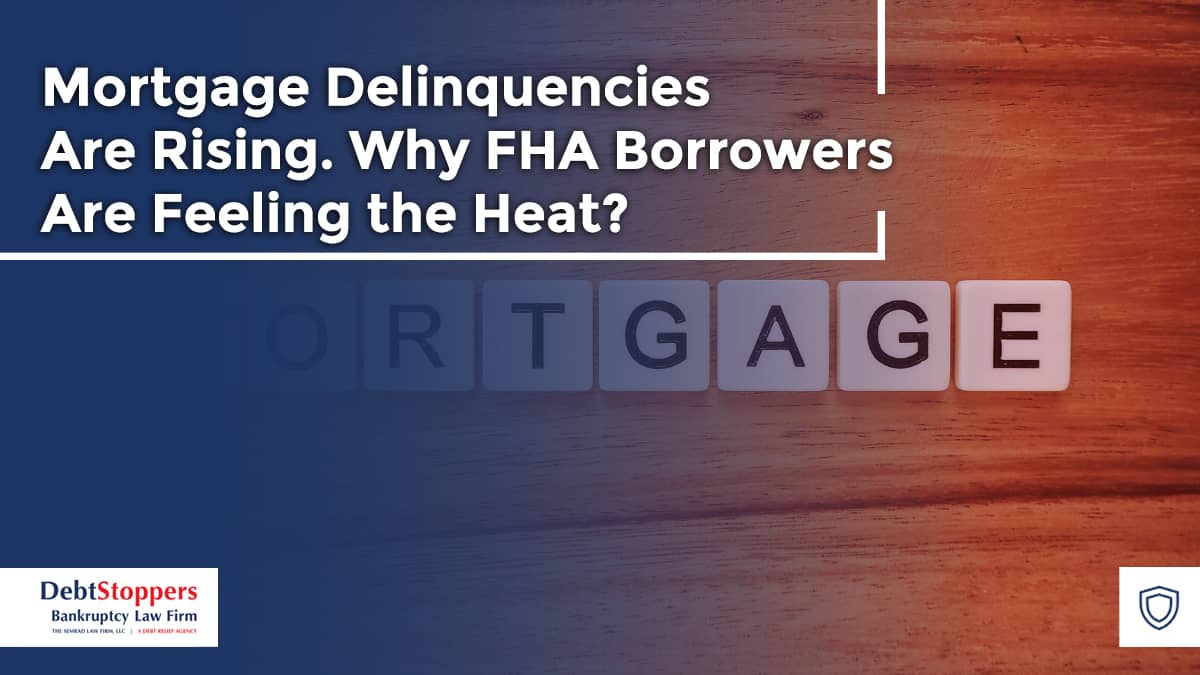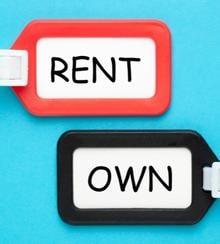Mortgage Delinquencies Are Rising. Why FHA Borrowers Are Feeling the Heat?

Mortgage delinquencies are rising, which signals growing financial strain for homeowners across America, especially those with FHA-backed loans.
FHA (Federal Housing Administration) loans, which are designed to help first-time and lower-income homebuyers access homeownership, now have the highest rates of delinquency among all types of home loans. While these loans offer flexible credit requirements and low down payments, they also come with a unique set of risks when economic conditions worsen.
Mortgage Delinquency Trends and Statistics
The housing market is beginning to show signs of stress as mortgage delinquency rates climb into 2025. Although the nation isn't facing a foreclosure crisis like in 2008, rising interest rates, inflation, and the end of pandemic-era protections have caused more homeowners to fall behind on their mortgage payments.
Recent data shows a troubling upward trend in delinquency rates across the United States. According to the Mortgage Bankers Association, the national delinquency rate on residential mortgages rose to 3.94% in Q4 of 2024, marking the highest level in nearly three years. This figure includes loans that are at least 30 days past due, and experts warn that more serious delinquencies (those 90+ days past due) are also on the rise.
The increase in delinquency is especially pronounced among FHA-backed loans, which are typically utilized by first-time buyers and working-class families. The FHA delinquency rate has risen to more than 10%, a drastic increase compared to just 2.5% for conventional loans and 3.7% for VA loans.
Several contributing factors include the expiration of pandemic-era forbearance programs, sustained inflation, and stretched family budgets. As interest rates on adjustable-rate mortgages and property taxes continue to grow, more homeowners are finding themselves unable to stay current on their payments.
Why FHA-backed mortgages show higher delinquency rates
FHA loans are specifically tailored for first-time home buyers and working-class families that often have lower credit scores and limited savings.
FHA loans have much lower down payment requirements than other mortgages, sometimes as little as 3.5% down, which means many FHA borrowers begin with little to no equity in their home. When the economic climate changes, they are susceptible to being underwater on their mortgage with little flexibility.
FHA borrowers often face higher monthly mortgage insurance premiums, which can significantly increase the overall cost of the loan. Combined with rising property taxes and utility costs, the total monthly payment for FHA borrowers can quickly exceed their original budget.
Additionally, FHA loans are more commonly issued in communities with historically lower median incomes. In areas where living expenses have surged but wages have not kept pace, many FHA borrowers can quickly find themselves struggling to keep up with their monthly mortgage payments.
Eligibility for FHA-HAMP or Other Relief Programs
People with FHA loans who are struggling with their mortgage may qualify for relief through programs like the FHA Home Affordable Modification Program (FHA-HAMP). This program is designed specifically for homeowners with FHA-insured loans who are either behind on payments or facing imminent default.
FHA-HAMP can lower your monthly payment by modifying your loan terms and deferring part of the balance to the end of the loan, making it easier to stay in your home. To be eligible, you must live in the home as your primary residence, have an FHA-insured loan, and be able to show financial hardship, such as a job loss, medical emergency, or rising expenses.
Other loan types may offer similar relief options. For example, borrowers with VA or USDA loans, or conventional mortgages owned by Fannie Mae or Freddie Mac, may qualify for different modification programs.

What Rising Mortgage Delinquencies Could Mean for the Housing Market
An increase in mortgage delinquencies, particularly among FHA borrowers, can have ripple effects throughout the housing market. If delinquency trends continue, the number of foreclosures is likely to rise in the coming months, which could increase the overall inventory of distressed properties on the market, especially in areas with high concentrations of FHA loans.
While more housing inventory might relieve pressure on housing prices, it could also lower home values, putting more homeowners at risk of negative equity. If home values drop far enough, even homeowners who are still current on their payments may find themselves underwater.
Additionally, rising delinquencies can impact the broader economy. Mortgage defaults lead to losses for lenders and mortgage-backed securities investors, which then tend to tighten lending standards and ultimately reduce access to credit for future buyers.
Credit Counseling and Financial Planning
If you are a homeowner who is starting to fall behind on your monthly mortgage payments or struggling to make ends meet, credit counseling can be extremely helpful.
A certified credit counselor can help assess your full financial picture, create a sustainable budget, and guide you through debt management strategies that may allow you to stay current on your mortgage.
Credit counseling agencies can also connect you with mortgage relief programs and help you apply for forbearance, repayment plans, or loan modifications. In some cases, they may negotiate directly with your lender to create a more manageable payment schedule.
Homeowners with FHA loans should be especially proactive when reviewing their budgets to set aside emergency savings if possible and stay alert to changes in their interest rates, insurance, and property taxes.

When Can a Mortgage Attorney Help You Out?
Credit counseling can be a great first step, but there are numerous situations where consulting a mortgage attorney is necessary. If you have already received a notice of default, foreclosure filing, or believe your lender has violated your legal rights, an attorney can protect your home and advocate on your behalf.
Mortgage attorneys can challenge improper foreclosure procedures, negotiate loan modifications or forbearance, defend against predatory lending practices, and file bankruptcy to stop foreclosure proceedings if necessary.
Foreclosure laws vary from state to state, and an experienced attorney will understand the laws in your state and can help ensure your rights are protected. For example, Illinois uses a judicial foreclosure process, which means lenders must go through the courts to foreclose on your home. However, in nonjudicial states like Texas, foreclosures do not have to go through the courts and consequently can happen much more quickly.
An experienced mortgage attorney in your state can explain your rights, represent you in negotiations or court, and help you develop a strategy to save your home or minimize financial fallout.
The rise in mortgage delinquencies, particularly among FHA borrowers, is a growing concern that signals deeper economic challenges facing households across the country.
If you're behind on your mortgage, don’t wait until it’s too late. Seek help early. Whether through credit counseling or legal representation, there are options available to protect your home, your credit, and your peace of mind.





